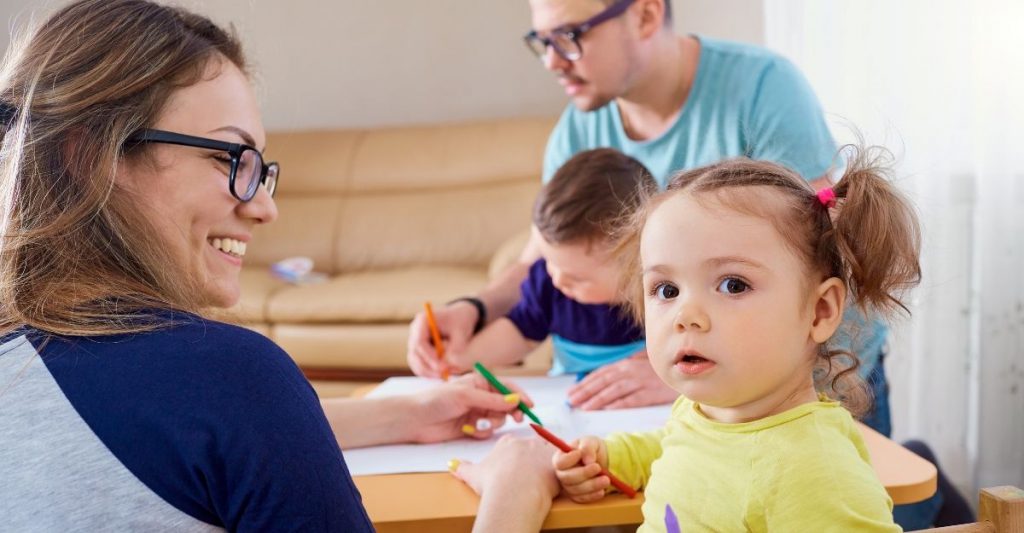“Trust is dyadic and reciprocal, and children must learn unique patterns of trusting for each person they encounter,” says Ken Rotenberg of Keele University, UK, in an article titled Life Stages of Trust.
A heavy chunk of learning in children is facilitated by observing and imitating elders around them, especially those who they trust. Therefore, as parents, it is crucial to understand the need and importance of building a Circle of Trust, a safe space for children that enables their emotional development in a healthy and conscientious manner.
What Is A Circle Of Trust?
Parents consciously aim at creating a safe environment for their children. The effort is not only focused on the surroundings, but also on the quality of activities and other humans they engage with, especially adults. This attempt to safeguard the child’s social, emotional and physiological well-being can be termed as building a mindful ‘Circle of Trust.’
As an adult, when you allow a bunch of people (friends, co-workers, neighbors, relatives,etc) into your life, you automatically introduce them in your child’s life as well. The child in turn begins to trust these people, without a second thought or question because you trust them.
It is, therefore, of utmost importance to filter your circle of trust primarily, in order to create a safe one for your child.
Where Can You Begin?
We want the best of everything we have to offer to our children. We’re often in a dilemma before choosing the ideal option to keep them safe. What is more important than contemplating where and when to begin, is to just get on with it. Making a note of the below-given questions, at all times, will be your closest asset in protecting the kids.
- How do the grown-ups from your circle interact with your children?
- Where do the grown-ups from your circle interact with your children?
Can Your Parenting Style Have An Influence On The Circle Of Trust?
Everybody has a certain strategy or method for child rearing, known as ‘parenting style’. Each style has its influence on the behavior and mental health of children. However, the most integral ingredient of each is trust. The level of trust between the parent and children determines the basis of the dynamics of their relationship.
Is your child obligated to trust his/her parents and the adults they are acquainted with? The answer is NO. Your child will be able to trust you only when you trust him/her first. Similar to communication, building trust is a two-way channel.
What Can You Do To Help Your Children Trust In You?
- LISTEN – When your child makes an attempt to share about the trivial events in life, ensure that you listen and not just hear. To listen means to pay attention, both mentally and by body language. It is only when the child knows that you are paying attention to even their small things and issues, that they start trusting you with the bigger incidents that might affect them.
- ATTUNE – It implies being present with children in a way where they really feel valued and understood. Children need to feel that they matter to you, not just by mere use of words, but via actions. Attuning with children goes a long way in helping them reach out to you without any hesitation, whether they’re feeling blue, confused or brimming with joy.
- DO NOT INVALIDATE, JUDGE, OR CRITICIZE – At times when the conversation or information being received from children does not “fit in” your point of view, try to understand theirs. It is essential that you do not brush off and/or pass negative remarks, about any person/thing when children are around. They are bound to make mistakes while growing up. When anything goes wrong, they need to feel assured and confident to approach you for being non-judgemental, rather than being scared of criticism.
- MAKE EYE CONTACT – Always speak to your children while making eye-contact. This little gesture not only validates point number 1 and 2 (mentioned above), but also makes them feel that you care. Children communicate excessively through non-verbal ways. Make the effort to notice them.
- BE EMOTIONALLY OPEN – Be open with children about your experiences. Share what you feel. Let it be known that no one is perfect and that adults also feel confused and need help sometimes. This not only lowers the risk of children trying to become people pleasers, but also reduces the probability of excessive moral guilt trip. The acceptance of the fact that learning from mistakes is more important than being perfect aids in self-acceptance.
Foster Resiliency Among Children To Choose A Reliable Circle Of Trust
Resilience has been defined as “an ability to recover from or adjust easily to misfortune or change.”
Fostering resiliency in children facilitates in embracing change and developing a fresh outlook towards people and situations. It is not an extraordinary inborn talent, but a lesson that can be learned by being conscious of one’s thoughts, feelings and actions.
- Join a group: Apart from the one-on-one relationships children share with the family, enrolling them in a civic group, the faith-based community, or clubs can provide the foundation to reach out for social support and gatherings. Such places can also turn out to be places of joy and comfort when needed to ‘bounce back’.
- Practice mindfulness: Practicing yoga, praying, meditation, journaling are basic methods to facilitate the habit of mindfulness in children. It helps in providing a personalized outlet to thoughts and emotions, and to build connections or restore hope when situations get tough to handle.
- Learning from the past: Reflecting on incidents and lessons learnt from the past can help children to respond effectively to new, difficult situations.
